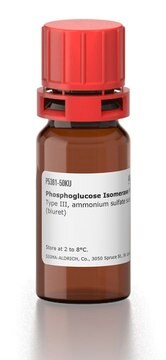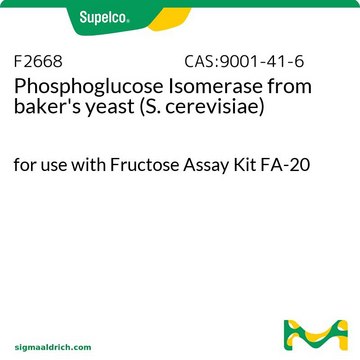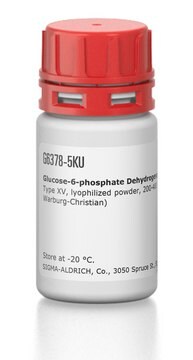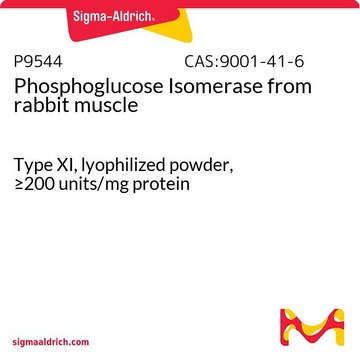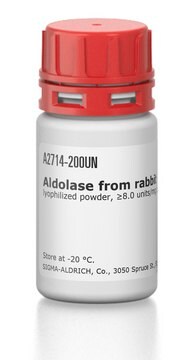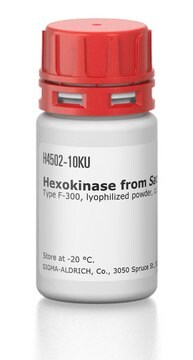P5538
Phosphoglucose Isomerase from Bacillus stearothermophilus
lyophilized powder, 300-1,000 units/mg protein
Synonym(s):
D-Glucose-6-phosphate ketol-isomerase, PGI, Phosphosaccharomutase
Sign Into View Organizational & Contract Pricing
All Photos(1)
About This Item
Recommended Products
form
lyophilized powder
Quality Level
specific activity
300-1,000 units/mg protein
mol wt
189 kDa
composition
Protein, ≥60% biuret
storage temp.
−20°C
General description
The enzyme is part of the glycolytic pathway. Also, it is important in the industrial production of fructose 1,6-diphosphate (FDP) from glucose. The molecular mass is found to be approximately 189 kDa and it consists of four subunits, each with a molecular mass of approximately 50 kDa. Optimum pH is found to be between 9-10 and the isoelectric point is 4.2.
Application
Phosphoglucose Isomerase (PGI) is an enzyme crucial for the interconversion of D-glucose 6-phosphate and D-fructose 6-phosphate. PGI is responsible for the second step of glycolysis and is involved in glucogenesis. It is highly conserved in bacteria and eukaryotes. It is used in sugar assays to convert fructose to glucose. This product is from Bacillus stearothermophilus.
The enzyme from Sigma has been used in the determination of fructose 6-phosphate in a mutant strain of Rhizobium meliloti.
Biochem/physiol Actions
Phosphoglucose Isomerase fuctions as an isomerase, neuroleukin, autocrine motility factor, and a differentiation and maturation mediator.
Unit Definition
One unit will convert 1.0 μmole of D-fructose 6-phosphate to D-glucose 6-phosphate per min at pH 9.0 at 30 °C.
Physical form
lyophilized powder containing Tris buffer
Signal Word
Danger
Hazard Statements
Precautionary Statements
Hazard Classifications
Resp. Sens. 1
Storage Class Code
11 - Combustible Solids
WGK
WGK 3
Flash Point(F)
Not applicable
Flash Point(C)
Not applicable
Personal Protective Equipment
dust mask type N95 (US), Eyeshields, Gloves
Choose from one of the most recent versions:
Already Own This Product?
Find documentation for the products that you have recently purchased in the Document Library.
A Arias et al.
Journal of bacteriology, 137(1), 409-414 (1979-01-01)
A mutant strain of complex phenotype was selected in Rhizobium meliloti after nitrosoguanidine mutagenesis. It failed to grow on mannitol, sorbitol, fructose, mannose, ribose, arabitol, or xylose, but grew on glucose, maltose, gluconate, L-arabinose, and many other carbohydrates. Assay showed
The Kinetics and Mechanism of a Reaction Catalyzed by Bacillus stearothermophilus Phosphoglucose Isomerase.
Widjaja A, et al.
Journal of Fermentation and Bioengineering, 86(3), 324-331 (1998)
Kosei Nakajima et al.
Oncology reports, 28(6), 1953-1958 (2012-10-03)
Autocrine motility factor (AMF) plays an important role in the development of metastasis by regulating tumor cell motility. The expression of AMF is associated with metastasis in malignant musculoskeletal tumors including osteosarcoma. Recent studies indicated that hyperthermia contributes to the
Veera Kainulainen et al.
Journal of bacteriology, 194(10), 2509-2519 (2012-03-06)
Glutamine synthetase (GS) and glucose-6-phosphate isomerase (GPI) were identified as novel adhesive moonlighting proteins of Lactobacillus crispatus ST1. Both proteins were bound onto the bacterial surface at acidic pHs, whereas a suspension of the cells to pH 8 caused their
Simone Frédérique Brenière et al.
PLoS neglected tropical diseases, 6(5), e1650-e1650 (2012-06-12)
The current persistence of Triatoma infestans (one of the main vectors of Chagas disease) in some domestic areas could be related to re-colonization by wild populations which are increasingly reported. However, the infection rate and the genetic characterization of the
Our team of scientists has experience in all areas of research including Life Science, Material Science, Chemical Synthesis, Chromatography, Analytical and many others.
Contact Technical Service

